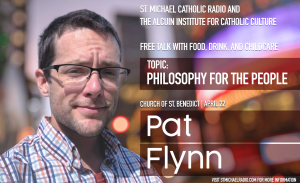Fasting – What the Early Church Fathers Said
What is fasting?
Refraining from food and drink as an expression of interior penance, in imitation of the fast of Jesus for 40 days in the desert. Fasting is an ascetical practice recommended in Scripture and the writings of the Church Fathers; it is sometimes prescribed by a precept of the Church, especially during the liturgical season of Lent.
Why should you fast?
CCC 1434:
The interior penance of the Christian can be expressed in many and various ways. Scripture and the Fathers insist above all on three forms, fasting, prayer, and almsgiving, which express conversion in relation to oneself, to God, and to others. Alongside the radical purification brought about by Baptism or martyrdom they cite as means of obtaining forgiveness of sins: efforts at reconciliation with one’s neighbor, tears of repentance, concern for the salvation of one’s neighbor, the intercession of the saints, and the practice of charity “which covers a multitude of sins.
What the Early Church Fathers said:
Didache (The Teaching of the 12 Apostles)
“Before the baptism, moreover, the one who baptizes and the one being baptized must fast, and any others who can. And you must tell the one being baptized to fast for one or two days beforehand. Your fasts must not be identical with those of the hypocrites.”
Pope Clement I
“Let them, therefore, with fasting and with prayer make their adjurations, and not with the elegant and well-arranged and fitly-ordered words of the learning, but as men who have received the gift of healing from God, confidently, to the glory of God. By your fastings and prayers and perpetual watching, together with your other good works, mortify the works of the flesh by the power of the Holy Spirit”
The Shepherd of Hermas
“This fasting… is very good, provided the commandments of the Lord be observed… First of all, be on your guard against every evil word, and every evil desire, and purify your heart from all the vanities of this world. If you guard against these things, your fasting will be perfect. An you will do also as follows. Having fulfilled what is written, in the day on which you fast you will taste nothing but bread and water; and having reckoned up the price of the dishes of that day which you intended to have eaten, you will give it to a widow, or an orphan, or to some person in want, and thus you will exhibit humility of mind, so that he who has received benefit from your humility may fill his own soul, and pray for you to the Lord. If you observe fasting, as I have commanded you , your sacrifice will be acceptable to God, and the fasting will be written down; and the service thus performed is noble, and sacred, and acceptable to the Lord.”
Tertullian
“Let us fast, brethren and sisters, lest tomorrow perchance we die.” Openly let us vindicate our disciplines. Sure we are that “they who are in the flesh cannot please God;” not, of course, those who are in the substance of the flesh, but in the care, the affection, the work, the will, of it. Emaciation displeases not us; for it is not by weight that God bestows flesh, any more than He does “the Spirit by measure.”
The Desert Fathers
“Abba Isidore said, “If you fast regularly, do not be inflated with pride; if you think highly of yourself because of it, then you had better eat meat. It is better for a man to eat meat than to be inflated with pride and glorify himself”
Macarius of Egypt
“This is the mark of Christianity: however much a man toils, and however many righteous deeds he performs, to feel that he has done nothing, and in fasting to say, “This is not fasting,” and in praying, “This is not prayer,” and in perseverance at prayer, “I have shown no perseverance; I am only just beginning to practice and to take pains”; and even if he is righteous before God, he should say, “I am not righteous, not I; I do not take pains, but only make a beginning every day.”
Saint Basil the Great
“Fasting gives birth to prophets and strengthens the powerful; fasting makes lawgivers wise. Fasting is a good safeguard for the soul, a steadfast companion for the body, a weapon for the valiant, and a gymnasium for athletes. Fasting repels temptations, anoints unto piety; it is the comrade of watchfulness and the artificer of chastity. In war it fights bravely, in peace it teaches stillness.”
Saint Augustine (354–430)
“Fasting cleanses the soul, raises the mind, subjects one’s flesh to the spirit, renders the heart contrite and humble, scatters the clouds of concupiscence, quenches the fire of lust, and kindles the true light of chastity. Enter again into yourself.”
If you are interested in fasting with others, this is a great website to go to: Click Here

